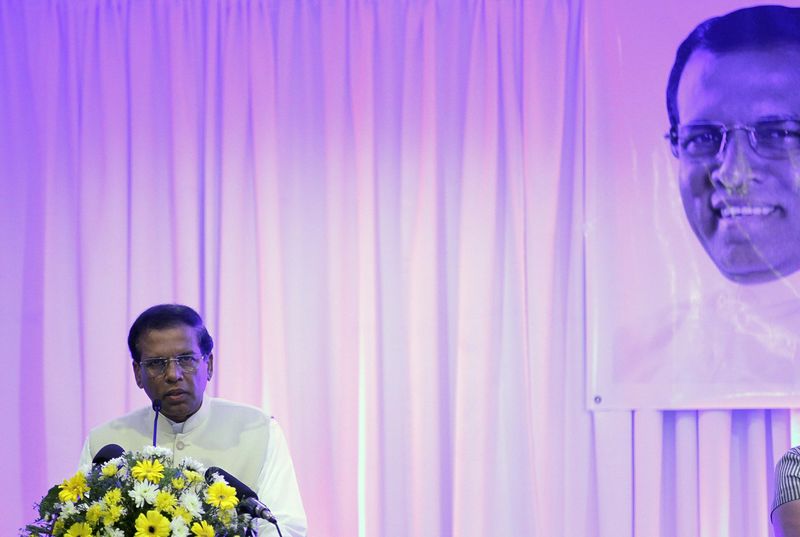By Ranga Sirilal and Shihar Aneez
COLOMBO (Reuters) - President Mahinda Rajapaksa's bid for a third term hung in the balance as Sri Lanka went to the polls on Thursday, with voters split between the "devil they know" and an upstart who has promised to root out corruption and political decay.
Rajapaksa won handsomely in the last election, surfing a wave of popularity that sprang from the 2009 defeat of ethnic Tamil separatists who had waged a crippling war against the government for 26 years.
Reminding voters of Rajapaksa's triumph, state-controlled television showed clips of Wednesday's attack in Paris by suspected Islamist militants at the offices of a satirical magazine and then switched seamlessly to old footage of the Sri Lankan war.
"When we see these images we also remember the history of terrorism in Sri Lanka," one announcer said.
Although his popularity has waned, Rajapaksa called the election two years early, confident that the perennially fractured opposition would fail to find a credible challenger.
But he did not anticipate the emergence of Mithripala Sirisena, a cabinet minister who crossed to the other side to become the opposition's candidate, triggering a flood of defections from the government.
"It has been a big shock for the president," said a Western diplomat in Colombo, recalling Rajapaksa's campaign-trail plea to voters to back "the devil they know" rather than an "unknown angel".
Some 15 million people are eligible to vote in the election, and a result is expected to emerge in the early hours of Friday.
With more than 25,000 domestic and about 70 foreign monitors observing the vote, the election commission said it was confident the poll would be free and fair.
Nevertheless, rumours were rife this week that force would be used in some areas to scare Sirisena voters away, that the result would somehow be distorted or even that the military might be deployed if Rajapaksa looked set to lose.
A local observer group, the Centre for Monitoring Election Violence, said there had been "unparalleled misuse of state resources and media" by Rajapaksa's party and that police inaction had given free rein to election-related violence in which one person was killed and dozens were injured.
A hand grenade was hurled at a house next to a polling station in the Tamil-majority north of the country but officials said no one was hurt by what appeared to be an attempt to intimidate voters. Election officials said voter turnout in the once war-torn northern district stood at 30 percent by noon.
Voting proceeded with few hitches elsewhere, but in Colombo the chief election commissioner visited a state-run television station to demand it correct a report that a prominent opposition leader had defected to Rajapaksa's camp.
YEARNING FOR CHANGE
There were no reliable opinion polls ahead of the vote, but many believe Sirisena will benefit from a popular yearning for change after a decade under Rajapaksa.
The economy has flourished in recent years, and many voters - especially ethnic Sinhalese Buddhists who represent 70 percent of the population - believe that sticking with Rajapaksa will keep living standards on an upward path.
However, many voters complain of high living costs, rampant corruption and an authoritarian style that has concentrated power in the hands of the president's family.
On foreign policy, Rajapaksa has cold-shouldered neighbouring India. He has also fallen out with Western countries that want an international investigation of possible war crimes and criticise his record on human rights, turning instead to China as a strategic and investment partner.
Sirisena, who would lead a potentially fractious coalition of ethnic, religious, Marxist and centre-right parties if he wins, has pledged to abolish the executive presidency that gave Rajapaksa unprecedented power and hold a fresh parliamentary election within 100 days.

He has also promised a crackdown on corruption, which would include investigations into big infrastructure projects such as a $1.5 billion deal with China Communications Construction Co Ltd to build a port city.
(Writing by John Chalmers; Editing by Robert Birsel) 2015-01-08T023735Z_1_LYNXMPEB0703A_RTROPTP_1_SRI-LANKA-POLITICS.JPG urn:newsml:onlinereport.com:20150108:nRTROPT20150108023735LYNXMPEB0703A Sri Lankan President Mahinda Rajapaksa listens to a speech during his final rally ahead of presidential election in Piliyandala OLGBWORLD Reuters UK Online Report World News 20150107T190747+0000 20150108T023735+0000